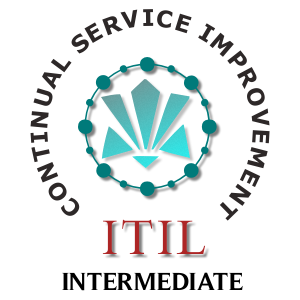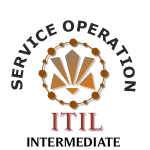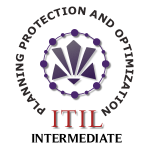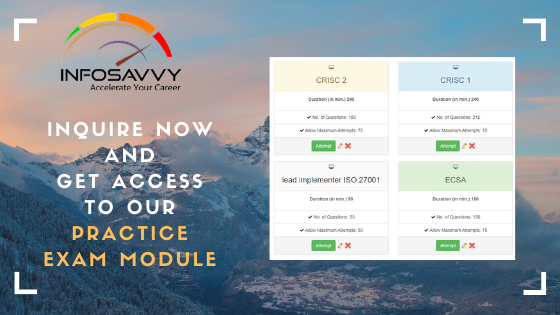The ITIL Intermediate Qualification: Continual Service Improvement (CSI) Certificate is a free-standing qualification, but is also part of the ITIL Intermediate Lifecycle stream, and one of the modules that leads to the ITIL Expert Certificate in IT Service Management. The purpose of this training module and the associated exam and certificate is, respectively, to impart, test, and validate the knowledge on industry practices in service management as documented in the ITIL Continual Service Improvement publication.
ITIL Intermediate Continual Service Improvement
Original price was: ₹27,000.00.₹25,000.00Current price is: ₹25,000.00.
- Introduction to continual service improvement
- Full understanding of service design terms and core concepts.
- The purpose, objectives and scope of CSI
- The value to the business of adopting and implementing CSI
- The context of CSI in the ITIL service lifecycle
- The approach to CSI, including key interfaces and inputs and outputs
- Full understanding of service design terms and core concepts.
- Continual service improvement principles
- The knowledge, interpretation and analysis of improvement principles,
techniques and relationships, and their application to ensure continual service improvement.- How the success of CSI depends on understanding change in the organization and having clear accountability
- How service level management and knowledge management influence and support CSI
- How the complete Deming Cycle works, and how it can be applied to a real world example
- How CSI can make effective use of the various aspects of service measurement
- What situations require the use of frameworks and models, and examples of how each type can be used to achieve improvement
- The knowledge, interpretation and analysis of improvement principles,
- Service operation processes
- The knowledge, interpretation and analysis of improvement principles,
techniques and relationships, and their application to ensure continual service improvement.- What the seven-step improvement process is, how each step can be applied and the benefits produced
- How CSI integrates with the other stages in the ITIL service lifecycle
- How other processes play key roles in the seven-step improvement process
- The knowledge, interpretation and analysis of improvement principles,
- Continual service improvement methods and techniques
- The knowledge, interpretation and analysis of improvement principles,
techniques and relationships, and their application to ensure continual service improvement.- When to use assessments, what to assess and how a gap analysis can provide insight into the areas that have room for improvement
- How to use benchmarking, service measurement, metrics, service reporting, including balanced scorecard and SWOT, to support CSI
- How to create a return on investment, establish a business case and measure the benefits achieved
- How techniques within availability management, capacity management, IT service continuity management and problem management can be used by CSI
- The knowledge, interpretation and analysis of improvement principles,
- Organizing for continual service improvement
- The knowledge, interpretation and analysis of improvement principles,
techniques and relationships, and their application to ensure continual service improvement.- The role of the CSI manager, and the roles of service owner, process owner, process manager and process practitioner in the context of CSI and how they can be positioned within an organization
- How to design, implement and populate a RACI (responsible, accountable, consulted, informed) diagram as well as how to use it to support CSI
- The knowledge, interpretation and analysis of improvement principles,
- Technology considerations
- The knowledge, interpretation and analysis of improvement principles,
techniques and relationships, and their application to ensure continual service improvement.- The technology and tools required and how these would be implemented and managed to support CSI activities such as performance, project and portfolio management, as well as service measurement and business intelligence reporting
- The knowledge, interpretation and analysis of improvement principles,
- Implementing continual service improvement
- The knowledge, interpretation and analysis of improvement principles,
techniques and relationships, and their application to ensure continual service improvement.- CSI implementation: strategy, planning, governance, communication, project management, operation, as well as how to deal with cultural and organizational change
- The knowledge, interpretation and analysis of improvement principles,
- Challenges, critical success factors and risks
- The knowledge, interpretation and analysis of improvement principles,
techniques and relationships, and their application to ensure continual service improvement.- The challenges and risks such as staffing, funding, management, etc., which can be related to CSI and the details behind how each challenge can be addressed
- The critical success factors related to CSI as well as how to measure and monitor them
- The knowledge, interpretation and analysis of improvement principles,
• Chief information officers (CIOs)
• Chief technology officers (CTOs)
• Managers
• Supervisory staff
• Team leaders
• Service designers
• IT architects
• IT planners
• IT consultants
• IT audit managers
• IT security managers
Prerequisite Entry Criteria
Candidates wishing to be trained and examined for this qualification must already hold the ITIL Foundation Certificate in IT Service Management which must be presented as documentary evidence to gain admission Candidates who hold the following ITIL qualifications are also eligible, and similar evidence will be required:
• Earlier ITIL (V2) Foundation plus Foundation Bridge
• ITIL Expert Certificate in IT Service Management (achieved via Service Manager or Practitioner bridging routes).
Eligibility for Examination
To be eligible for the ITIL Intermediate Qualification: CSI examination, candidates must have fulfilled the following requirements:
• At least 18 contact hours (hours of instruction, excluding breaks, with an Accredited Training Organization (ATO) or an accredited e-learning solution) for this syllabus, as part of a formal, approved training course/scheme
• A basic IT literacy and around 2 years IT experience are highly desirable
• Hold the ITIL Foundation Certificate in IT Service Management
• It is also recommended that candidates should complete at least 21 hours of personal study by reviewing the syllabus and the ITIL Service Transition publication in preparation for the examination
Format of the Examination
- Type: Eight (8) multiple choice, scenario-based, gradient-scored questions.
Each question will have 4 possible answer options, one which is worth 5
marks, one which is worth 3 marks, one which is worth 1 mark, and one which
is a distracter and achieves no marks. - Duration Maximum 90 minutes for all candidates in their respective language
Provisions for Additional Time relating to language, Candidates completing an exam in a language that is not their mother tongue have a maximum of 120 minutes to complete the exam and are allowed the use of a dictionary. - Supervised Yes
- Open Book No
- Pass Score 28/40 or 70%
Overview
ITIL Intermediate Continual Service Improvement Training & Certification
The ITIL Intermediate Qualification: Continual Service Improvement (CSI) Certificate is a free-standing qualification, but is also part of the ITIL Intermediate Lifecycle stream, and one of the modules that leads to the ITIL Expert Certificate in IT Service Management. The purpose of this training module and the associated exam and certificate is, respectively, to impart, test, and validate the knowledge on industry practices in service management as documented in the ITIL Continual Service Improvement publication.
Course Outline
ITIL Intermediate Continual Service Improvement Training & Certification
-
Introduction to continual service improvement
- Full understanding of service design terms and core concepts.
- The purpose, objectives and scope of CSI
- The value to the business of adopting and implementing CSI
- The context of CSI in the ITIL service lifecycle
- The approach to CSI, including key interfaces and inputs and outputs
- Full understanding of service design terms and core concepts.
-
Continual service improvement principles
- The knowledge, interpretation and analysis of improvement principles,
techniques and relationships, and their application to ensure continual service improvement.- How the success of CSI depends on understanding change in the organization and having clear accountability
- How service level management and knowledge management influence and support CSI
- How the complete Deming Cycle works, and how it can be applied to a real world example
- How CSI can make effective use of the various aspects of service measurement
- What situations require the use of frameworks and models, and examples of how each type can be used to achieve improvement
- The knowledge, interpretation and analysis of improvement principles,
-
Service operation processes
- The knowledge, interpretation and analysis of improvement principles,
techniques and relationships, and their application to ensure continual service improvement.- What the seven-step improvement process is, how each step can be applied and the benefits produced
- How CSI integrates with the other stages in the ITIL service lifecycle
- How other processes play key roles in the seven-step improvement process
- The knowledge, interpretation and analysis of improvement principles,
-
Continual service improvement methods and techniques
- The knowledge, interpretation and analysis of improvement principles,
techniques and relationships, and their application to ensure continual service improvement.- When to use assessments, what to assess and how a gap analysis can provide insight into the areas that have room for improvement
- How to use benchmarking, service measurement, metrics, service reporting, including balanced scorecard and SWOT, to support CSI
- How to create a return on investment, establish a business case and measure the benefits achieved
- How techniques within availability management, capacity management, IT service continuity management and problem management can be used by CSI
- The knowledge, interpretation and analysis of improvement principles,
-
Organizing for continual service improvement
- The knowledge, interpretation and analysis of improvement principles,
techniques and relationships, and their application to ensure continual service improvement.- The role of the CSI manager, and the roles of service owner, process owner, process manager and process practitioner in the context of CSI and how they can be positioned within an organization
- How to design, implement and populate a RACI (responsible, accountable, consulted, informed) diagram as well as how to use it to support CSI
- The knowledge, interpretation and analysis of improvement principles,
-
Technology considerations
- The knowledge, interpretation and analysis of improvement principles,
techniques and relationships, and their application to ensure continual service improvement.- The technology and tools required and how these would be implemented and managed to support CSI activities such as performance, project and portfolio management, as well as service measurement and business intelligence reporting
- The knowledge, interpretation and analysis of improvement principles,
-
Implementing continual service improvement
- The knowledge, interpretation and analysis of improvement principles,
techniques and relationships, and their application to ensure continual service improvement.- CSI implementation: strategy, planning, governance, communication, project management, operation, as well as how to deal with cultural and organizational change
- The knowledge, interpretation and analysis of improvement principles,
-
Challenges, critical success factors and risks
- The knowledge, interpretation and analysis of improvement principles,
techniques and relationships, and their application to ensure continual service improvement.- The challenges and risks such as staffing, funding, management, etc., which can be related to CSI and the details behind how each challenge can be addressed
- The critical success factors related to CSI as well as how to measure and monitor them
- The knowledge, interpretation and analysis of improvement principles,
Who Should Attend
ITIL Intermediate Continual Service Improvement Training & Certification
Chief information officers (CIOs)
• Chief technology officers (CTOs)
• Managers
• Supervisory staff
• Team leaders
• Service designers
• IT architects
• IT planners
• IT consultants
• IT audit managers
• IT security managers
Exam Information
ITIL Intermediate Continual Service Improvement Training & Certification
Prerequisite Entry Criteria
Candidates wishing to be trained and examined for this qualification must already hold the ITIL Foundation Certificate in IT Service Management which must be presented as documentary evidence to gain admission Candidates who hold the following ITIL qualifications are also eligible, and similar evidence will be required:
• Earlier ITIL (V2) Foundation plus Foundation Bridge
• ITIL Expert Certificate in IT Service Management (achieved via Service Manager or Practitioner bridging routes).
Eligibility for Examination
ITIL Intermediate Continual Service Improvement Training & Certification
To be eligible for the ITIL Intermediate Qualification: CSI examination, candidates must have fulfilled the following requirements:
• At least 18 contact hours (hours of instruction, excluding breaks, with an Accredited Training Organization (ATO) or an accredited e-learning solution) for this syllabus, as part of a formal, approved training course/scheme
• A basic IT literacy and around 2 years IT experience are highly desirable
• Hold the ITIL Foundation Certificate in IT Service Management
• It is also recommended that candidates should complete at least 21 hours of personal study by reviewing the syllabus and the ITIL Service Transition publication in preparation for the examination
Format of the Examination
ITIL Intermediate Continual Service Improvement Training & Certification
- Type: Eight (8) multiple choice, scenario-based, gradient-scored questions.
Each question will have 4 possible answer options, one which is worth 5
marks, one which is worth 3 marks, one which is worth 1 mark, and one which
is a distracter and achieves no marks. - Duration Maximum 90 minutes for all candidates in their respective language
Provisions for Additional Time relating to language, Candidates completing an exam in a language that is not their mother tongue have a maximum of 120 minutes to complete the exam and are allowed the use of a dictionary. - Supervised Yes
- Open Book No
- Pass Score 28/40 or 70%
ITIL Expert Managing Across the Lifecycle http://www.info-savvy.com/product/itil-expert-managing-across-the-lifecycle/
ITIL Foundation http://www.info-savvy.com/product/itil-foundation/
ITIL Intermediate Continual Service Improvement http://www.info-savvy.com/product/itil-intermediate-continual-service-improvement/
ITIL Intermediate Operational Support And Analysis http://www.info-savvy.com/product/itil-intermediate-operational-support-and-analysis/
ITIL Intermediate Planning Protection And Optimization http://www.info-savvy.com/product/itil-intermediate-planning-protection-and-optimization/
You must be logged in to post a review.










Reviews
There are no reviews yet.